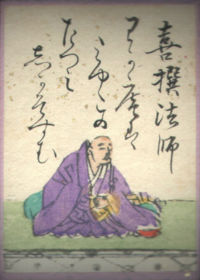Kisen
Appearance

Kisen (喜撰) also known as Kisen Hōshi (喜撰法師) was an early Heian period Buddhist monk (僧, sō) and poet. Little is known about his life other than that he lived in Ujiyama.
When Ki no Tsurayuki wrote the Japanese preface (仮名序, kanajo) of the Kokinshū, he selected Kisen as one of the six poetic sages (六歌仙, rokkasen) whose work was to be considered as superior. Tsurayuki says the following to comment on Kisen's work.
- ことばかすかにして 始め終り たしかならず。
- kotoba kasuka ni shite hajime wohari tashikanarazu. (note: exact transcription using classical kana orthography)
- The use of words is a delicate thing—from start to end it does not express the thing that actually is.
- いはば、 秋の月を見るに、 暁の雲に あへるが ごとし。
- ihaba, aki no tsuki wo miruni, akatsuki no kumo ni aheru ga gotoshi.
- That is to say, to speak of the autumn moon, one compares it to the clouds at dawn.
Kisen is sometimes said to be the author of the poetry collection waka sakushiki (倭歌作式) (also known as the kisen-shiki (喜撰式)), but it is probably apocryphal and created well after the end of the Heian period.
The following two eika (詠歌) of Kisen are the only poems that can be confidently traced back to him.
- わが庵は都の辰巳しかぞすむ世を宇治山と人はいふなり
- waga iho ha miyako no tatsumi shika zo sumu yo wo ujiyama to hito ha ifu nari
- Loosely: People say that I am a secluded hermit living in Ujiyama, but my hermitage is just to the southeast of the capital!
- (Kokinshū 18:983; also in the Ogura Hyakunin Isshu)
- 木の間より見ゆるは谷の蛍かもいさりに海人の海へ行くかも
- ki no ma yori miyuru ha tani no hotaru kamo isari ni ama no umi he yuku kamo
- Loosely: What I see through the trees seems to be the fireflies (蛍, hotaru) from the valley—or is that the luring fires (漁火, isaribi) of the fishermen as they head to the sea?
- (Gyokuyōshū 400)
See also
References
- This article is based on material from the equivalent article in the Japanese Wikipedia.
